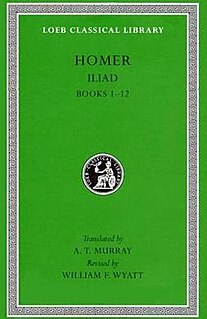Related Research Articles

David Hume was a Scottish Enlightenment philosopher, historian, economist, librarian and essayist, who is best known today for his highly influential system of philosophical empiricism, skepticism, and naturalism. Beginning with A Treatise of Human Nature (1739–40), Hume strove to create a naturalistic science of man that examined the psychological basis of human nature. Hume argued against the existence of innate ideas, positing that all human knowledge derives solely from experience. This places him with Francis Bacon, Thomas Hobbes, John Locke, and George Berkeley as a British Empiricist.

The Ptolemaic dynasty, the Thirty-third dynasty of Egypt, sometimes referred to as the Lagid dynasty, was a Macedonian Greek royal dynasty which ruled the Ptolemaic Kingdom in Ancient Egypt during the Hellenistic period. Their rule lasted for 275 years, from 305 to 30 BC. The Ptolemaic was the last dynasty of ancient Egypt.

The Loeb Classical Library is a series of books, originally published by Heinemann in London, UK, today by Harvard University Press, US, which presents important works of ancient Greek and Latin literature in a way designed to make the text accessible to the broadest possible audience, by presenting the original Greek or Latin text on each left-hand page, and a fairly literal translation on the facing page. The General Editor is Jeffrey Henderson, holder of the William Goodwin Aurelio Professorship of Greek Language and Literature at Boston University.
Benedict has been the regnal name of fifteen Roman Catholic popes. The name is derived from the Latin benedictus, meaning "blessed".
Papal coats of arms are the personal coat of arms of popes of the Catholic Church. These have been a tradition since the Late Middle Ages, and has displayed his own, initially that of his family, and thus not unique to himself alone, but in some cases composed by him with symbols referring to his past or his aspirations. This personal coat of arms coexists with that of the Holy See.

Corps badges in the American Civil War were originally worn by soldiers of the Union Army on the top of their army forage cap (kepi), left side of the hat, or over their left breast. The idea is attributed to Maj. Gen. Philip Kearny, who ordered the men in his division to sew a two-inch square of red cloth on their hats to avoid confusion on the battlefield. This idea was adopted by Maj. Gen. Joseph Hooker after he assumed command of the Army of the Potomac, so any soldier could be identified at a distance.

A taxonomic system, the Bentham & Hooker system for seed plants, was published in Bentham and Hooker's Genera plantarum ad exemplaria imprimis in herbariis kewensibus servata definita in three volumes between 1862 and 1883.

The Insolvency Act 1986 is an Act of the Parliament of the United Kingdom that provides the legal platform for all matters relating to personal and corporate insolvency in the UK.
The Labour Party Rule Book is the governing document for the Labour Party in the United Kingdom.
History of Friedrich II of Prussia, Called Frederick the Great was a biography of Friedrich II of Prussia written by Scottish historian Thomas Carlyle. It was first published in 1858.

An Essay on the History of Civil Society is a book by Scottish Enlightenment philosopher Adam Ferguson, first published in 1767. The Essay established Ferguson's reputation in Britain and throughout Europe. In the second section of the third part of the Essay discussing the history of political establishments, Ferguson states "Every step and every movement of the multitude, even in what are termed enlightened ages, are made with equal blindness to the future; and nations stumble upon establishments, which are indeed the result of human action, but not the execution of any human design."
Alexander Donaldson was a Scottish bookseller, publisher, and printer. Donaldson was the founding publisher of the weekly newspaper, the Edinburgh Advertiser. He was also known for selling cheap copies of books after their copyright had expired in disregard to London booksellers' opinions on literary property.
Alexander Kincaid (1710–1777) was an 18th-century Scottish printer and publisher who served as Lord Provost of Edinburgh 1776/77.
References
- ↑ See Hume, David (1758). Essays and Treatises on Several Subjects (New ed.). Strand and Edinburgh: A. Millar and A. Kincaid & A. Donaldson. Retrieved 28 June 2014– via Internet Archive.
david hume essays.
- ↑ See Essays, Moral and Political. Edinburgh: A. Kincaid. 1741. Retrieved 15 June 2015. via Google Books
- ↑ See Hume, David (1752). Political Discourses (2 ed.). Edinburgh: A. Kincaid and A. Donaldson. Retrieved 16 June 2015.
David Hume.
via Google Books - ↑ Fieser, James (2006). "David Hume (1711-1776)". The Internet Encyclopedia of Philosophy. Retrieved 11 May 2017.
- ↑ "The manuscripts, Letter from Andrew Millar to Thomas Cadell, 16 July, 1765. Andrew Millar Project. University of Edinburgh". www.millar-project.ed.ac.uk. Retrieved 2016-06-06.